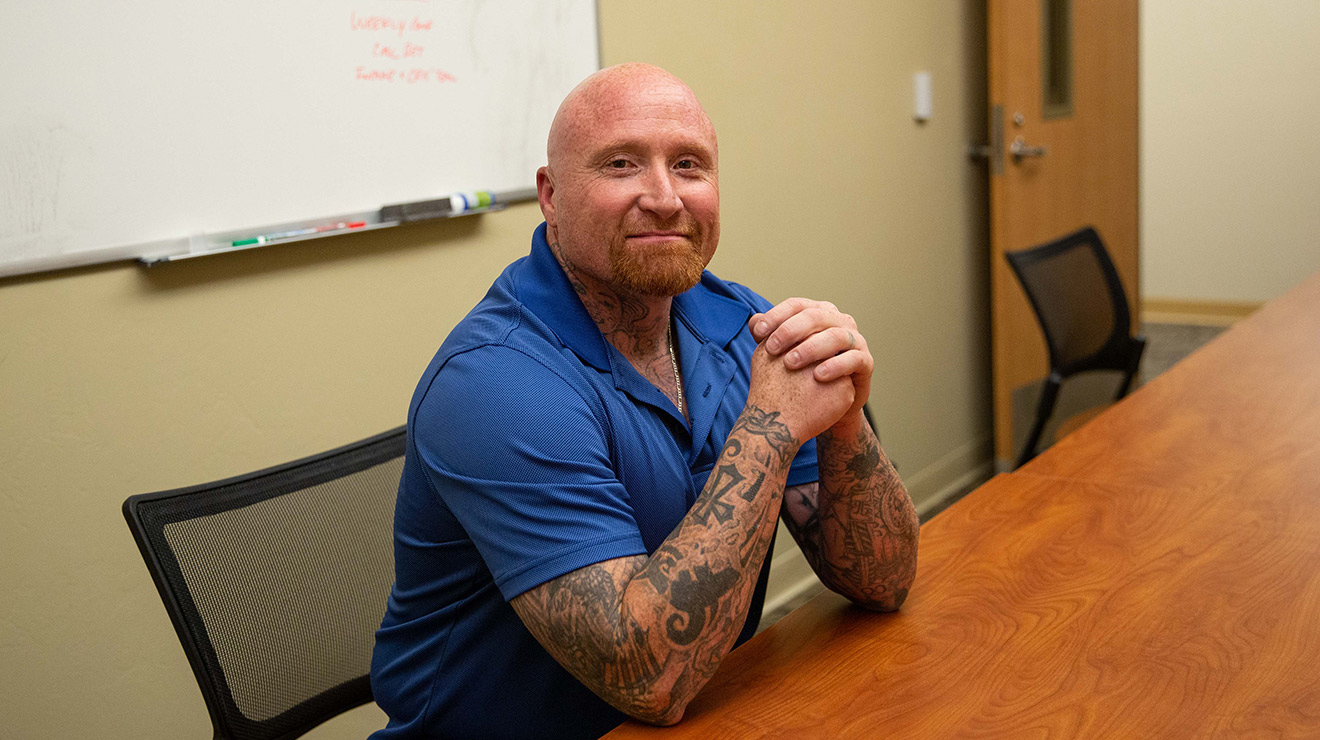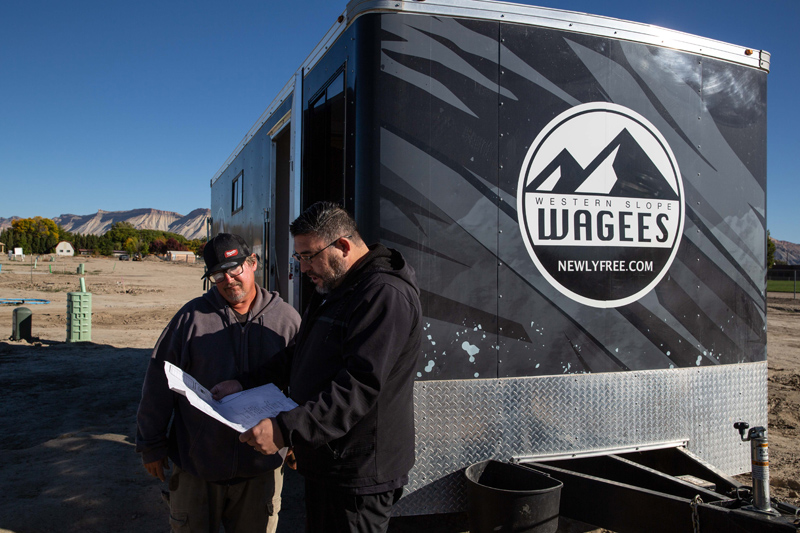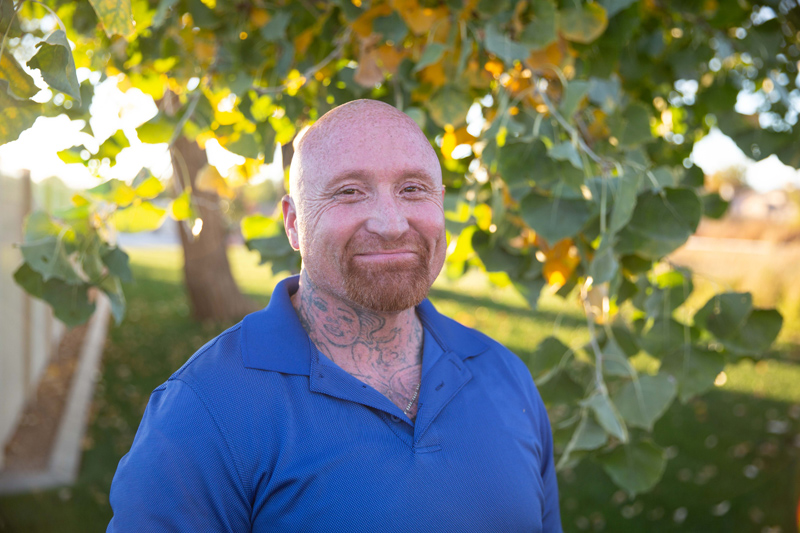
Gary Swenson, 45, now a peer specialist at a Grand Junction treatment program for concurrent mental health and substance abuse conditions, has spent approximately half of his life in prison. Photos by Luna Anna Archey / Special to The Colorado Trust
Gary Swenson, 45, now a peer specialist at a Grand Junction treatment program for concurrent mental health and substance abuse conditions, has spent approximately half of his life in prison. Photos by Luna Anna Archey / Special to The Colorado Trust
Richard Gallegos was locked up in the Mesa County Jail for the first time at age 18. He spent the next eight years in and out of jail—typically drug and alcohol-fueled misdemeanors that sometimes led to more serious incidents, including (nonviolent) domestic disputes and resisting arrest, he said. At 27, he was sentenced to prison for a drug and firearms violation.
Altogether, Gallegos, born and raised in Grand Junction and now 45 years old, has spent five years in state prison and three years in county jail. For the past four years, he has been on probation. He now works at a job where he’s learning masonry, a switch from the oil and gas industry work he did previously.
“I’m staying honest, humble,” he said. “I try not to walk with too much shame. The best thing in my favor is I have been forgiven by those I’ve wronged. They understand drug addiction.”
Gallegos shares an apartment with an adult daughter, but many formerly incarcerated friends are not so lucky, he said.
“People are coming out of jail with no resources,” Gallegos said. “You better hope you have a support system. Resources are slim to none coming out of county jail.
“You’re on your own, facing what put you in there in the first place. People’s first thought is often, ‘I want to do what’s right—but where do I go?’”
Mesa County officials have long recognized that many people transitioning from jail or prison struggle with substance abuse, mental illness or both—compounding the multiple other challenges they face when reentering society, and often lacking much-needed resources like Gallegos did.
The Mesa County Sheriff’s Office compared names of frequent users of the jail with frequent visitors to emergency rooms at Grand Junction’s two acute care hospitals, Community Hospital and St. Mary’s Medical Center. (To protect patient privacy, the two hospitals did not disclose names, but confirmed that many people appeared on both lists.) They identified 60-90 frequent users of both the jail and emergency rooms. Most of these frequent users face challenges related to mental health diagnoses or substance abuse, said Mesa County Commissioner Janet Rowland, who has led an effort to address the issue.
In September, Mesa County launched a new multiagency collaboration (county officials refer to it as MAC), aimed at helping people successfully transition from incarceration. The collaboration connects people to agencies that can assist with employment, housing, transportation and other basic needs, as well as access to mental health services or rehabilitation programs to combat drug or alcohol addictions.
Reentering Society
In April 2021, 50% of people held in the Mesa County Jail were on mental health medications, said Mesa County Sheriff Todd Rowell. Mental health and/or substance abuse issues are a significant factor in recidivism rates at the jail, said Rowell. While people can receive treatment for these conditions while incarcerated, they often lack continuity of care once they leave jail and, thus, can be prone to reoffending, he said.
In 2020, when overall arrests were down due to the COVID-19 pandemic, one man was arrested 19 times, Rowell noted. A dozen other people were arrested four to eight times each.
“I was frustrated. I felt people had almost zero chance to succeed after jail,” Rowell said. “Life is hard anyways, particularly after spending three months in jail. Finding work is almost impossible. It’s a benefit to any county to understand those challenges to change the recidivism.”
Mesa County did not have a transition coordinator at its jail until it hired Julie Mamo in 2019. She visited jails in Boulder and Douglas counties to learn about their reentry programs while creating Mesa County’s program. The new multiagency collaboration builds on the program Mamo founded.
Thus far, Mesa County has enlisted three agencies to provide services to help people with reentry: Amos Counseling, a Grand Junction-based counseling service; Foundations 4 Life, an organization that provides substance use disorder and mental health services to people involved in the justice system; and the Freedom Institute, a nonprofit that offers WAGEES (Work and Gain Education and Employment Skills), a community reentry program within the Colorado Department of Corrections.
The Freedom Institute has already been providing WAGEES services for prison parolees in Grand Junction. Its new county contract now allows the Freedom Institute to offer those same services to the jail population.

Freedom Institute Executive Director Micah Espinoza (right) speaks with a colleague at a WAGEES program landscaping job site in Grand Junction.
Lisa Mills, Mesa County’s behavioral health strategies manager, decides which agency can best meet the specific needs of a person leaving jail. Case managers are given no more than 10 clients—the goal is to meet with people daily if necessary—to ensure they are adhering to prescription medications, able to access food assistance, acquire bus passes, find employment and housing. Upon release, people are met at the jail by an agency staff member for rides to where they are staying or wherever else they need to go. The agencies work closely with the jail’s two transition coordinators.
The county secured a $400,000 grant from the Colorado Department of Human Services’ Office of Behavioral Health to fund the program. St. Mary’s Medical Center and the Mesa County Sheriff’s Office each pitched in another $300,000 for a total of $1 million.
“It’s a long overdue program,” said Lieutenant Henry Stoffel of the Mesa County Sheriff’s Office. “A lot of people leave our facility and don’t have basic human needs, and so they often reoffend. We want to get them out of that cycle.”
Returning to Prison for Minor Offenses
It’s taken 45-year-old Gary Swenson 20 years to get out of that cycle. His involvement with the justice system began at age 12 when he was sentenced to a Colorado juvenile detention center for a burglary he committed with a relative and two friends. By age 18 he was addicted to methamphetamine. He has spent half his life in and out of state prison.
Swenson said he found it challenging to meet his parole obligations without a reliable source of transportation. Public transit didn’t exist in the Grand Valley when he needed it, and he wasn’t allowed to drive until he had fulfilled parole obligations. Employers were annoyed that he asked to leave work a couple times each week to attend mandatory substance abuse classes. He also had to take time off to submit weekly urine samples for drug screenings—which he was required to pay for himself, along with the classes.
“Your employer has to be real understanding, which they’re usually not,” Swenson said.
He said most of his time behind bars was for parole violations, including once for receiving a speeding ticket, or on other occasions for missing those classes—all violations for which he’d be sent right back to prison.
“It was always a prison sentence,” as opposed to probation or a halfway house, Swenson said.
ProPublica (a national nonprofit media outlet that receives funding from The Colorado Trust) recently reported on how easy it is to be sent back to prison for minor offenses. The number of people in Colorado who return to prison within three years is 50%, one of the worst recidivism rates in the nation, according to a 2018 Virginia Department of Corrections report cited by ProPublica.
Douglas County’s reentry program includes a jail medication-assisted treatment program that helps people with opioid use disorder. The county had a 42% recidivism rate in 2021, which is lower than the statewide average, said Nicole Beckett, the jail-based behavioral health services administrator in Douglas County. Its reentry program includes working with probation officers, pretrial officers, public defenders and community behavioral health professionals.
“It’s definitely our goal to disrupt the cycle of incarceration,” Beckett said. “People with substance use disorders face risk of relapse, making them a challenging population to help.”
Boulder County’s reentry program added a housing coordinator, Kim Smith, in 2019 to focus specifically on helping people find housing in the city’s extremely tight market. People on probation are prohibited from leaving Boulder County to seek more affordable housing elsewhere. With such a competitive housing market, landlords can easily choose not to rent to people with criminal records, said Smith. The reentry program has seen an 80% success rate of people avoiding recidivism.
Mesa County officials say reentry programs are rare in rural areas due to a lack of resources. County Sheriffs of Colorado, a nonprofit that provides programs and support to sheriffs statewide, does not track the number of counties offering transition programs.
While Mesa County Jail offers some programs in-house, it needs more space, and continuity of care has been an issue once people leave jail, Stoffel said. He would like the jail’s transition program to double or triple in size, and said he expects reentry programs to increase across Colorado.
“They’re in treatment for 45 days; recovery is for life,” Mamo said.

A Freedom Institute worker at a job site in Mesa County. The organization purchased a house that had burned, with plans to convert it to transitional housing for formerly incarcerated people.
Readjusting to Life
In July, Mamo launched a program similar to one she witnessed in Douglas County that helps people acquire identification cards. A Department of Motor Vehicles mobile unit comes to the jail twice a month to issue IDs.
“Most people need two forms of ID,” said Lory Villumsen, a second transition coordinator hired in June. “We process the application to help with getting them their Social Security card.” The transition team is additionally working on finding birth certificates for people.
Mamo has created partnerships with transitional sober living spaces, reunited people with family members who reside outside the community, and enrolled people in treatment programs—sometimes out of town. The challenges of reentry are similar, whether transitioning from jail or prison, except lengthier prison sentences often means a person has become more “institutionalized,” making it more difficult to adjust to life on the outside, Mamo said.
People who are incarcerated are told when to eat, when to sleep, what to wear and what to do; “when people leave jail, we need to empower them to make all these decisions,” Stoffel noted.
Freedom Institute executive director Micah Espinoza hopes that working with people leaving county jail will keep them out of prison.
“Once you’re convicted of a felony, and have fulfilled your sentence, you still pay for that the rest of your life,” Espinoza said. As part of the multiagency collaboration, “we’re targeting people going in and out of jail for typically petty offenses. Why are they committing these crimes? It’s usually poverty, homelessness, substance abuse, mental health.”
Swenson said he’s learned from his mistakes; he’s been out of prison for almost two years and is on unsupervised probation for the first time. He works as a peer specialist for the Circle Program, a residential treatment program in Grand Junction for men age 18 and older with concurrent substance abuse and mental health disorders.
“There are people in this program I’ve been in prison with, gotten high with,” Swenson said. “They see ‘if Gary can do it,’ they can. It’s me not forgetting where I came from.
“Instead of locking people up for possession, give us an opportunity first to work with them,” he continued. “A lot of guys don’t want to be high, live on the streets, be homeless—it’s just all they know. Being part of this program is a chance to see an opportunity.”
